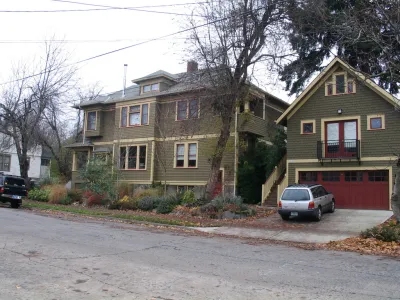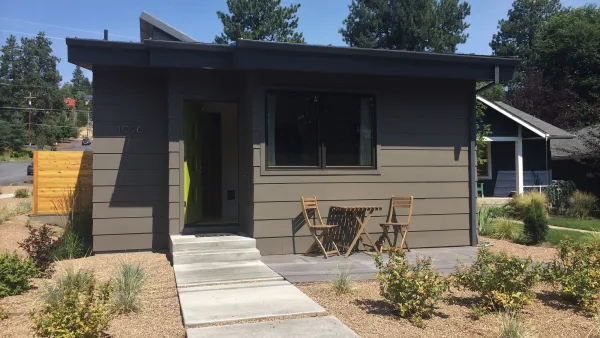Proponents of a new Accessory Dwelling Unit rule in Seattle say the tactics of opponents backfired with this Environmental Impact Study.

Dan Bertolet reports from Seattle, where the city recently released a highly anticipated Environmental Impact Study (EIS) on a proposed rule change that would allow for more construction of Accessory Dwelling Units in Seattle's residential neighborhoods.
According to Bertolet, the study was provoked by an appeal by anti-development activists led by Marty Kaplan. Bertolet provides a scathing critique of Kaplan's obstructionist positions in an earlier post from April 2017.
Now the environmental study responds to the appeal, and Bertolet says it reveals the appeal as "bunk": "baseless claims eviscerated by analysis and evidence." As an example, see here Bertolet's analysis of concerns about displacement:
The appeal’s most grievous complaint was that making it easier to build accessory dwelling units (ADUs) would lead to displacement in lower-income communities of color. In other words, poor people would lose homes to rich speculators.
The appeal’s most grievous complaint was that making it easier to build accessory dwelling units (ADUs) would lead to displacement in lower-income communities of color. In other words, poor people would lose homes to rich speculators. As the appeal’s de-facto leader, Marty Kaplan, warned: “There would be a feeding frenzy for anybody with a truck and a nail bag to go buy homes and convert them into three rental units and displace the population.”
Math begs to differ. The EIS finds that relaxing ADU rules would lead to fewer teardowns of existing single-family houses—which would decrease the likelihood of renter displacement—and that teardowns are less likely in lower-priced neighborhoods to begin with. It also demonstrates that in Seattle the value of selling a house, with or without ADUs, eclipses the value derived from renting. So much for any rental conversion “feeding frenzy.”
Bertolet also analyzes the study's findings regarding parking, before pointing a finger at the enabler for the study's delay: the Washington State Environmental Policy Act (SEPA). A lot more analysis of the study follows. If you're looking for more, there's also another article along the same lines written earlier in the week by Erica Barnett.
FULL STORY: SEATTLE’S NEW ENVIRONMENTAL STUDY ON ACCESSORY DWELLINGS OBLITERATES OBSTRUCTIONISTS’ CLAIMS

Analysis: Cybertruck Fatality Rate Far Exceeds That of Ford Pinto
The Tesla Cybertruck was recalled seven times last year.

National Parks Layoffs Will Cause Communities to Lose Billions
Thousands of essential park workers were laid off this week, just before the busy spring break season.

Retro-silient?: America’s First “Eco-burb,” The Woodlands Turns 50
A master-planned community north of Houston offers lessons on green infrastructure and resilient design, but falls short of its founder’s lofty affordability and walkability goals.

Test News Post 1
This is a summary

Analysis: Cybertruck Fatality Rate Far Exceeds That of Ford Pinto
The Tesla Cybertruck was recalled seven times last year.

Test News Headline 46
Test for the image on the front page.
Urban Design for Planners 1: Software Tools
This six-course series explores essential urban design concepts using open source software and equips planners with the tools they need to participate fully in the urban design process.
Planning for Universal Design
Learn the tools for implementing Universal Design in planning regulations.
EMC Planning Group, Inc.
Planetizen
Planetizen
Mpact (formerly Rail~Volution)
Great Falls Development Authority, Inc.
HUDs Office of Policy Development and Research
NYU Wagner Graduate School of Public Service




























